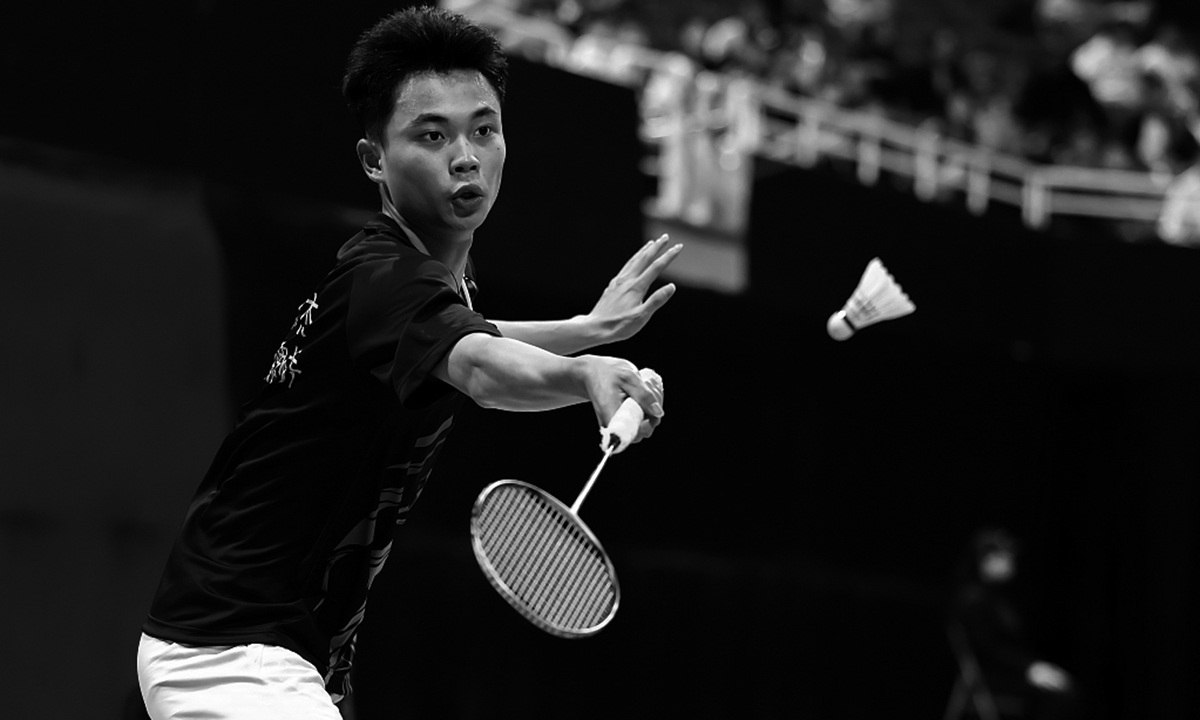The death of Chinese teenage badminton player Zhang Zhijie has sparked an outcry and heated discussions across Chinese social media as the public has been questioning the first aid that he received after he collapsed.

Badminton athlete Zhang Zhijie plays in a match in Nanchang, East China's Jiangxi Province,on March 28, 2024. Photo: VCG
The 17-year-old died as a result of cardiac arrest on Sunday after he collapsed during a group stage match at the Badminton Asia Junior Championships held in Yogyakarta, Indonesia, according to a press conference conducted by the Badminton Association of Indonesia (PBSI) on Monday.
On Tuesday, Chinese players held Zhang's jersey to pay tribute to him during the award ceremony after China defeated South Korea 3-1 in the mixed team final of the event.
The Badminton World Federation (BWF) said in a statement on Tuesday that Zhang's death was tragic and that all necessary steps would be taken to thoroughly review the matter in consultation with PBSI. BWF is waiting for an official report from Badminton Asia and the local organizing committee to assess whether correct medical procedures were followed during the incident, the statement added.
Video footage shows that after the athlete fell to the ground and began convulsing, medical personnel did not immediately enter the scene. When they finally arrived, they did not use an automated external defibrillator (AED) or perform cardiopulmonary resuscitation (CPR). Instead, after nearly two minutes, they used a stretcher to carry the athlete off the field to the hospital.
Officials from the PBSI said at the press conference that upon arrival at the hospital, the athlete showed no signs of breathing or pulse. They attributed the delayed medical response captured on video to the necessity for medical personnel to obtain permission from referees to enter the court.
This explanation not only exposes the administrative hurdles in delivering emergency aid at international sports events but also underscores the crucial importance that a person's life is more important than anything else in an emergency.
Many people have compared the tragic incident with Denmark soccer star Christian Eriksen, who suffered a cardiac arrest during a game at Euro 2020, outlining what happened within 14 minutes after the Danish collapsed on the pitch. Medical staff rushed onto the pitch eight seconds after he fell to the ground and conducted first aid immediately. An AED was brought to the scene in 52 seconds and the Danish midfielder received cardiopulmonary resuscitation after 96 seconds.
After 14 minutes of emergency treatment, Eriksen was seen regaining consciousness and then stretchered off the field. Fitted with an implantable cardioverter defibrillator, he returned to the Premier League just eight months later and scored Denmark's opening goal at the ongoing Euro 2024 against Slovenia.
The miracle survival of Eriksen could not have been possible without the text-book emergency response of medical staff, the availability of the AED and first aid devices, and an overriding principle that life matters the most in an emergency.
Delays in intervention could severely impact the outcome.
This sheer contrast between the emergency responses in Zhang and Eriksen's cases has sparked controversy and put the Indonesian organizers under scrutiny.
The death of the Chinese badminton athlete highlights the importance of swift and effective medical response in sports settings and emphasizes the need for preparedness, equipment availability, clear communication and constant protocol improvement.
To prevent similar incidents, the PBSI plans to propose the BWF review the standard operating procedures for medical teams providing emergency assistance to players during tournaments.
According to the event organizer, the current rules require medical teams wait for a call from the referee before entering the court.
Unnecessary delays should be corrected and we can't wait to streamline protocols at the cost of an athlete's life.
The author is a reporter with the Global Times. life@globaltimes.com.cn




